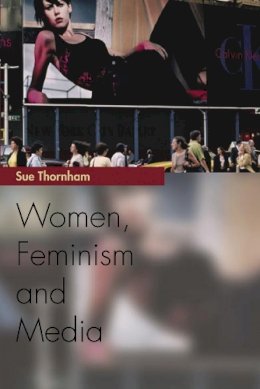11%OFF

Stock image for illustration purposes only - book cover, edition or condition may vary.
Women, Feminism and Media
Sue Thornham
€ 34.99
€ 31.05
FREE Delivery in Ireland
Description for Women, Feminism and Media
Paperback. A study of the key areas of issue and debate in feminist media studies over the past twenty years. Editor(s): Alia, Valerie. Series: Media Topics. Num Pages: 184 pages, 7 B&W. BIC Classification: JFD; JFFK. Category: (UP) Postgraduate, Research & Scholarly; (UU) Undergraduate. Dimension: 144 x 217 x 14. Weight in Grams: 232.
Over the past few decades feminist media scholarship has flourished, to become a major influence on the fields of media, film and cultural studies. At the same time, the cultural shift towards 'post-feminism' has raised questions about the continuing validity of feminism as a defining term for this work. This book explores the changing and often ambivalent relationship between the three terms women, feminism and media in the light of these recent debates. At the same time it places them within the broader discussions within feminist theory - about subjectivity, identity, culture, and narrative - of which they have formed a crucial part. The book is organised around four key topic areas. 'Fixing into Images' offers a rethinking of one of the first preoccupations of feminist media analysis: the relationship between women and images. 'Narrating Femininity' explores the narratives of femininity produced in media texts in the light of theories of narrative and identity. 'Real Women' examines both the continuing absence of women's voices from the genres of news and documentary, and their over-presence within popular 'reality' media forms. Finally, 'Technologies of Difference' examines the relationship between feminism, women and new media technologies. Throughout, the book explores key issues within feminist media studies both through specific examples and via critical engagement with the work of major theoretical writers. Features *A completely up-to-date study of the key areas of issue and debate in feminist media studies. *Includes case studies and discussion of the work of key writers in the field. *Contains readings of specific texts, ranging from news and advertising to reality TV and 'postfeminist' TV drama.
Product Details
Publisher
Edinburgh University Press
Number of pages
184
Format
Paperback
Publication date
2007
Series
Media Topics
Condition
New
Number of Pages
184
Place of Publication
Edinburgh, United Kingdom
ISBN
9780748620715
SKU
V9780748620715
Shipping Time
Usually ships in 5 to 9 working days
Ref
99-10
About Sue Thornham
Sue Thornham is Professor of Media and Film at the University of Sussex.
Reviews for Women, Feminism and Media
Women, Feminism and Media is a brilliant interdisciplinary synthesis of decades of academic and activist debate. Not only does this book have a breath-taking theoretical and empirical scope but it also delivers complex ideas with an admirable clarity and situates them in the changing political and cultural contexts which are so crucial to understanding their development and significance. This is a first-class textbook and will become a must for students in media studies, women's studies and cultural studies alike.
Jackie Stacey, Professor in Women's Studies and Cultural Studies, University of Lancaster Women, Feminism and Media is a brilliant interdisciplinary synthesis of decades of academic and activist debate. Not only does this book have a breath-taking theoretical and empirical scope but it also delivers complex ideas with an admirable clarity and situates them in the changing political and cultural contexts which are so crucial to understanding their development and significance. This is a first-class textbook and will become a must for students in media studies, women's studies and cultural studies alike.
Jackie Stacey, Professor in Women's Studies and Cultural Studies, University of Lancaster Women, Feminism and Media is a brilliant interdisciplinary synthesis of decades of academic and activist debate. Not only does this book have a breath-taking theoretical and empirical scope but it also delivers complex ideas with an admirable clarity and situates them in the changing political and cultural contexts which are so crucial to understanding their development and significance. This is a first-class textbook and will become a must for students in media studies, women's studies and cultural studies alike.
